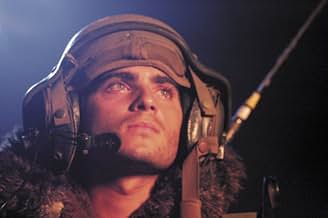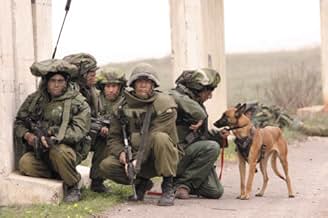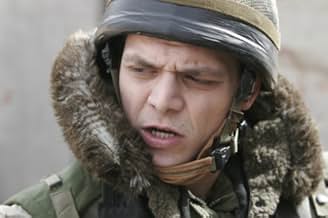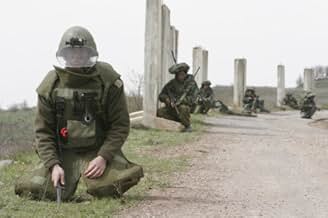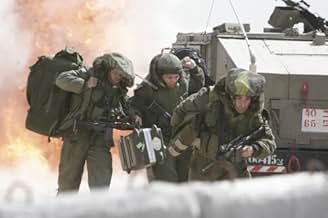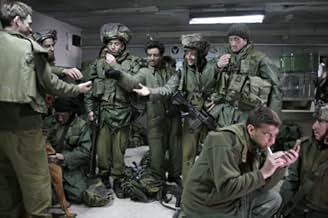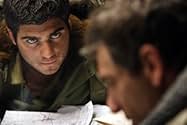IMDb-BEWERTUNG
6,7/10
4969
IHRE BEWERTUNG
Füge eine Handlung in deiner Sprache hinzuThe story of a group of Israeli soldiers stationed in an outpost prior to the withdrawal of forces of 2000.The story of a group of Israeli soldiers stationed in an outpost prior to the withdrawal of forces of 2000.The story of a group of Israeli soldiers stationed in an outpost prior to the withdrawal of forces of 2000.
- Für 1 Oscar nominiert
- 5 Gewinne & 9 Nominierungen insgesamt
Arthur Perzev
- Yonatan Shpitzer
- (as Arthur Faradjev)
Zohar Strauss
- Rossman
- (as Zohar Shtrauss)
Ya'akov Ahimeir
- Self
- (as Yaakov Ahimeir)
Empfohlene Bewertungen
10rob68
Beaufort is a remarkable war movie, with a cinematic style that really says something about the war and the situation in which the troops are in. the story is told through the eyes of the main character, Liraz, who's awareness of himself and the nature of the battle he's in gradually deepens into a sharp and original view on war and fear of death. the tension that is created throughout the film is a result not of fast paced action events, but through a series of scenes that takes the viewer into the world of this outpost, with all its claustrophobia, and mixed emotions that include the thrill of danger and numbness toward tragedy, but also simple fear that cannot be overcome. I recommend this movie to everyone.
This movie is simply amazing - but as mentioned else where - might be extremely problematic for the non Israeli, non IDF serving audience. Despite that - the movie has a universal notion that shines through: occupation wars that last for years on end with no clear objective except to stay in the occupied land cannot be won. This is hardly even war - its the use of naive young men, using their sense of patriotism and love for their country and willingness to serve it for a twisted, outdated political machination that ends up killing them and putting them in impossible situations. The movie was criticized for being far too left winged, but I view it as mostly right winged - it shows the camaraderie of soldiers, the bonds that can only be created, or so it seems, in a close knit military unit. Also - there are no women in the movie, not even by voice - which further serves to show a society built on macho-ism and the devotion for young men and their sacrifices to the country. There are no talks of peace here, no talk about negotiations or even viewing the enemy as human. There is only running away or fighting. Despite all that - the movie captures a sense of reality, filled with all variants of humor and pain and longing to get home that captured me completely. I served 4 years in the IDF and this movie manages to get to the core, to the essence of the unbelievable situation of serving, fighting and dieing without knowing why, without seeing any goal or reason in the madness - only following orders.
This is one of the best Israely movies created - if you have any interest in Israely cinema, regardless of your political or other views, don't miss it.
This is one of the best Israely movies created - if you have any interest in Israely cinema, regardless of your political or other views, don't miss it.
I'm not a fan of the war genre, but Beaufort plays out more as a psychological thriller, and I find it hard to fault. There was an amazing blend of naturalism, stylistic devices, humour, touching human drama and suspense - at one time I jumped in my seat like I never have before.
The camera movements and cinematography are excellent and reinforce a sense of claustrophobia as a group of Israeli soldiers keep guard at an historic fort within southern Lebanon, but are virtually under siege by Hezbollah forces. Character development is also excellent with much authenticity. The film focuses on the idiosyncrasies of various characters and how they interact with each other under the circumstances. Respect for the commanding officer is sometimes lacking, resulting in a lack of discipline and friction at a difficult time.
I count this film as one of my favourite films in the genre, kind of a cross between Stanley Kubrick's Full Metal Jacket and Sam Mendes' Jarhead, and as good as either of these. Like these two films, there is an understated political critique in how young men are pawns in the games played by those who live comfortably away from the field of battle and death. Whether you like war films or not, this is must-see cinema.
I saw the film's screening at the Melbourne International Film Festival.
The camera movements and cinematography are excellent and reinforce a sense of claustrophobia as a group of Israeli soldiers keep guard at an historic fort within southern Lebanon, but are virtually under siege by Hezbollah forces. Character development is also excellent with much authenticity. The film focuses on the idiosyncrasies of various characters and how they interact with each other under the circumstances. Respect for the commanding officer is sometimes lacking, resulting in a lack of discipline and friction at a difficult time.
I count this film as one of my favourite films in the genre, kind of a cross between Stanley Kubrick's Full Metal Jacket and Sam Mendes' Jarhead, and as good as either of these. Like these two films, there is an understated political critique in how young men are pawns in the games played by those who live comfortably away from the field of battle and death. Whether you like war films or not, this is must-see cinema.
I saw the film's screening at the Melbourne International Film Festival.
'A more mature version of Buffalo Soldiers' would be the easy, one sentence summary for 2007 Isreali film Beaufort; a film looking at the smaller, less exciting situations and scenarios behind the larger, more significant situations and scenarios that shape certain people's lives. The film is slow, but deliberately so, pointing out the insanities of war by having the primary soldier characters sit around and eventually loose interest at the sound of shelling and warning of incoming explosive shells; thus leading to a potentially damaging mental attitude when something dangerous isn't initially treated as such. If people are to find the film slow, then the film has done its job because it avoids following a nice, neatly plotted route that instigates familiarity and a sense of accomplishment. What the characters do is a slow process, and Beaufort studies it.
Joseph Cedar's film sees a number of Isreali troops inhabit a reasonably large bunker in southern Lebanon at Beaufort Castle stronghold. The year is 2000, and the troops are a part of Isreal's army holding the area from Lebanon forces located several miles away and mostly limited to the odd rocket or shell landing on or around the area of the stronghold. The film builds to the historic IDF withdrawal, in which the Isreali troops abandoned the fort and the conflict fizzled out with a political handover. Cedar uses the time leading up to this event as a chance to deconstruct the troops; to have them indulge in any necessary acts of questioning one's role in life and in the conflict as well as document what it took for the men involved to get by; to live; to survive and, ultimately, to get by the monotony.
No, don't worry – there are no tank drivers ploughing into other vehicles whilst under the influence of drugs in this film like there are in Buffalo Soldiers. Rather than take guidance from a Cheech and Chong movie, Beaufort draws on 1981's 'Das Boot' for inspiration, at least according to Cedar himself. The inspired ideas are clear: a study of what happens in-between conflict with the enemy and how conflict with friends as well as foes can lead to everyone's downfall. Beaufort's approach to the material, that could so easily have been delivered hollowly and without much intrigue, isn't an airy and sweeping approach that relies on long, long takes of external shots of the fort. Instead, it is constructed in an uncanny sense; that this space we are inhabiting should be something to be feared, and that while conflict is sparse with gunfire and man-on-man conflict almost non-existent - that doesn't mean we are not in a war-zone of some kind in the first place.
Beaufort carries a low and pulsating noise on its musical track almost entirely throughout. It's a very obvious noise, obvious more at certain times than others, creating an eerie and uneasy sense for a lot of the close, claustrophobic shots of inside the bunker itself. This early series of exchanges, which is meant to get across the bunker as a place of fear, is actually told through the eyes of a certain soldier named Ziv (Knoller), a bomb expert specifically called in to look at a suspicious object not too far away. Since it is our first taste of the bunker at Beaufort, we get to see the dwelling through the eyes of this new recruit as fear and uncertainty washes over us as it does with Ziv. There is no doubt Cedar applies this tactic and removes Ziv from the text at the point he feels we are embedded within the locale and no longer need a rookie's viewpoint to break us in.
Some of the more uncanny items that crop up during this opening segment might include Ziv's encounter with a dummy dressed as an Isreali soldier; the manner in which the approach is constructed with the positioning of the doll and the finding out of what it is with the sudden appearance of a friendly soldier, with the rest of the film playing out under grey skies or the black of night, is unexpectedly unsettling and works really well. But this is all introduction, and the bulk of the film will revolve around several other Isreali soldiers, Koris (Tiran); Shpitzer (Perzev) and Liraz (Cohen) to name but a few. Beaufort sees fit to plunge us head first into explosive combat as many of the guys try to avoid incoming artillery shells although later on, the direct hitting of the base, drolly announced by a tannoy with the words 'impact, impact', doesn't seem to have an affect on anyone anymore.
Following the continuous so-called monotony of the shells hitting the area, there is one such incidence during which a missile of some description hits the base and everybody suddenly takes notice.The impact is a lot larger and a lot louder than the usual shells, causing panic; causing a sense of urgency. What follows is further use of sound effects as a means of the uncanny what with a bizarre diegetic/non-diegetic siren sound effect clogging up the sound tracks and disorientating the audience just as much as the characters. Beaufort is a film that documents the absurdities of war but through a relatively peaceful and mundane setting and one of its more seductive accomplishments is how it delivers a tale about essentially bored people, in a manner in which we actually find them interesting. Credit where credit's due, Beaufort works.
Joseph Cedar's film sees a number of Isreali troops inhabit a reasonably large bunker in southern Lebanon at Beaufort Castle stronghold. The year is 2000, and the troops are a part of Isreal's army holding the area from Lebanon forces located several miles away and mostly limited to the odd rocket or shell landing on or around the area of the stronghold. The film builds to the historic IDF withdrawal, in which the Isreali troops abandoned the fort and the conflict fizzled out with a political handover. Cedar uses the time leading up to this event as a chance to deconstruct the troops; to have them indulge in any necessary acts of questioning one's role in life and in the conflict as well as document what it took for the men involved to get by; to live; to survive and, ultimately, to get by the monotony.
No, don't worry – there are no tank drivers ploughing into other vehicles whilst under the influence of drugs in this film like there are in Buffalo Soldiers. Rather than take guidance from a Cheech and Chong movie, Beaufort draws on 1981's 'Das Boot' for inspiration, at least according to Cedar himself. The inspired ideas are clear: a study of what happens in-between conflict with the enemy and how conflict with friends as well as foes can lead to everyone's downfall. Beaufort's approach to the material, that could so easily have been delivered hollowly and without much intrigue, isn't an airy and sweeping approach that relies on long, long takes of external shots of the fort. Instead, it is constructed in an uncanny sense; that this space we are inhabiting should be something to be feared, and that while conflict is sparse with gunfire and man-on-man conflict almost non-existent - that doesn't mean we are not in a war-zone of some kind in the first place.
Beaufort carries a low and pulsating noise on its musical track almost entirely throughout. It's a very obvious noise, obvious more at certain times than others, creating an eerie and uneasy sense for a lot of the close, claustrophobic shots of inside the bunker itself. This early series of exchanges, which is meant to get across the bunker as a place of fear, is actually told through the eyes of a certain soldier named Ziv (Knoller), a bomb expert specifically called in to look at a suspicious object not too far away. Since it is our first taste of the bunker at Beaufort, we get to see the dwelling through the eyes of this new recruit as fear and uncertainty washes over us as it does with Ziv. There is no doubt Cedar applies this tactic and removes Ziv from the text at the point he feels we are embedded within the locale and no longer need a rookie's viewpoint to break us in.
Some of the more uncanny items that crop up during this opening segment might include Ziv's encounter with a dummy dressed as an Isreali soldier; the manner in which the approach is constructed with the positioning of the doll and the finding out of what it is with the sudden appearance of a friendly soldier, with the rest of the film playing out under grey skies or the black of night, is unexpectedly unsettling and works really well. But this is all introduction, and the bulk of the film will revolve around several other Isreali soldiers, Koris (Tiran); Shpitzer (Perzev) and Liraz (Cohen) to name but a few. Beaufort sees fit to plunge us head first into explosive combat as many of the guys try to avoid incoming artillery shells although later on, the direct hitting of the base, drolly announced by a tannoy with the words 'impact, impact', doesn't seem to have an affect on anyone anymore.
Following the continuous so-called monotony of the shells hitting the area, there is one such incidence during which a missile of some description hits the base and everybody suddenly takes notice.The impact is a lot larger and a lot louder than the usual shells, causing panic; causing a sense of urgency. What follows is further use of sound effects as a means of the uncanny what with a bizarre diegetic/non-diegetic siren sound effect clogging up the sound tracks and disorientating the audience just as much as the characters. Beaufort is a film that documents the absurdities of war but through a relatively peaceful and mundane setting and one of its more seductive accomplishments is how it delivers a tale about essentially bored people, in a manner in which we actually find them interesting. Credit where credit's due, Beaufort works.
10tongue-3
In 1982, Israel was forced to invade southern Lebanon in self defense after repeated attacks. But after holding a buffer zone for 18 years, with increasing casualties caused by a strengthening Hezbollah, the army's presence there began to seem pointless.
This is a story about soldiers stationed at an outpost in Lebanon just before the eventual withdrawal in 2000. It manages to raise many valid moral and existential questions without getting preachy or politically partisan. Beaufort is a strong film that really sticks in your mind afterwards. The dialogues spoken by the soldiers is very true to life and the movie is highly authentic in every respect. It is well directed, the cast is good across the board, and the visuals are persuasive and gripping. But most of all, Beaufort succeeds in giving you a real sense of the fear and suspense of being a sitting duck for Hezbollah rocket-launchers to fire at. It is utterly nerve-wrecking.
Minor flaws include the customary setting-up of a character's personality just before he gets killed, to make you mourn his loss more, but such obvious manipulations are few and don't significantly hurt the movie.
This is a story about soldiers stationed at an outpost in Lebanon just before the eventual withdrawal in 2000. It manages to raise many valid moral and existential questions without getting preachy or politically partisan. Beaufort is a strong film that really sticks in your mind afterwards. The dialogues spoken by the soldiers is very true to life and the movie is highly authentic in every respect. It is well directed, the cast is good across the board, and the visuals are persuasive and gripping. But most of all, Beaufort succeeds in giving you a real sense of the fear and suspense of being a sitting duck for Hezbollah rocket-launchers to fire at. It is utterly nerve-wrecking.
Minor flaws include the customary setting-up of a character's personality just before he gets killed, to make you mourn his loss more, but such obvious manipulations are few and don't significantly hurt the movie.
Wusstest du schon
- WissenswertesThe lead actor, Oshri Cohen (Liraz), did not serve on the IDF (Israeli Defence Force).
- VerbindungenFeatured in The 80th Annual Academy Awards (2008)
Top-Auswahl
Melde dich zum Bewerten an und greife auf die Watchlist für personalisierte Empfehlungen zu.
- How long is Beaufort?Powered by Alexa
Details
- Erscheinungsdatum
- Herkunftsland
- Offizielle Standorte
- Sprache
- Auch bekannt als
- Thị Trấn Beaufort
- Drehorte
- Produktionsfirmen
- Weitere beteiligte Unternehmen bei IMDbPro anzeigen
Box Office
- Budget
- 2.500.000 $ (geschätzt)
- Bruttoertrag in den USA und Kanada
- 102.591 $
- Eröffnungswochenende in den USA und in Kanada
- 6.808 $
- 20. Jan. 2008
- Weltweiter Bruttoertrag
- 271.340 $
- Laufzeit2 Stunden 11 Minuten
- Farbe
- Sound-Mix
- Seitenverhältnis
- 2.35 : 1
Zu dieser Seite beitragen
Bearbeitung vorschlagen oder fehlenden Inhalt hinzufügen


